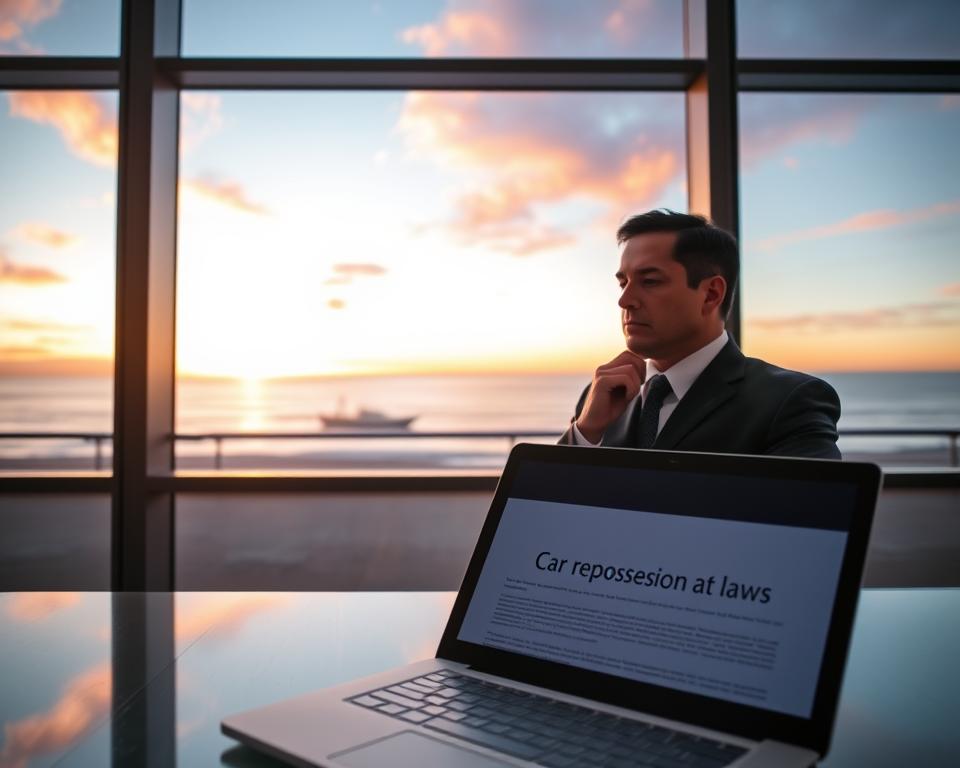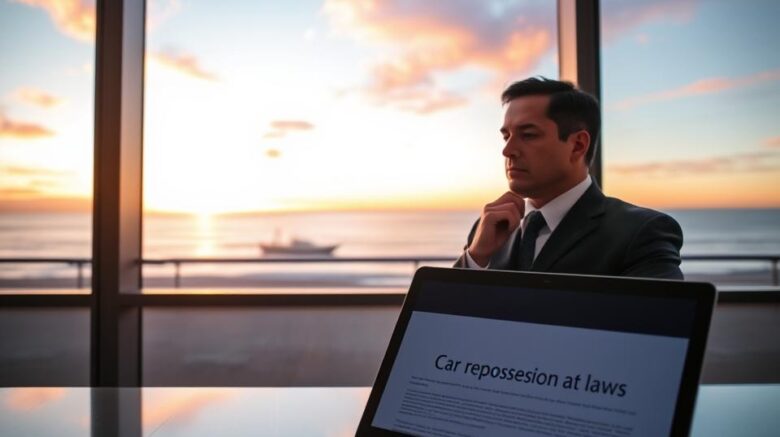Comprehending car repossession Laws within California
Have you ever pondered about the method in which a lender reclaims a car within the Golden State? Maneuvering through California repo may prove to be intricate, notably amid economic stress. Once credit agreements go unpaid, financiers may quickly initiate repossession. Yet, many aren’t aware of the specific rights and duties defined in the Golden State’s repossession regulations.
Upon a default on a loan, California allows financiers to take automobiles immediately. However, this does not make debtors vulnerable. Comprehending these regulations is essential for debtors aiming to safeguard their rights. This article will examine major facets of the Golden State’s Civil Code and Commercial Code, covering the course leading to repossession and consumer entitlements. Knowledge plays an essential role, especially with respect to your economic stability.
Overview of car repossession within California
Car repossession poses a major challenge for many within California facing economic challenges. It’s vital to grasp its fundamentals to better navigate possible obstacles. This occurs when a financier takes back a vehicle as a result of a breach in the loan terms. These measures can drastically hinder one’s employment opportunities or obtain essential services.
What is car repossession?
Repossession takes place as financiers take back automobiles from borrowers who breach their obligations. In California, defaulting on only one installment can prompt repossession. There is no grace period, compelling consumers to remain alert about their commitments.
Frequent Causes for Repossession
Knowing what leads to repossession is crucial to avoiding it. Frequent factors consist of:
- Failing to make scheduled payments
- Neglecting mandatory coverage requirements
- Violating certain provisions in the finance agreement
To evade repossession, proactive financial management and engaging with lenders are imperative. These measures may assist debtors maintain their car and the advantages they grant.
Comprehending Repossession Laws within California
The repossession regulations of California shield the concerns of both financiers and consumers. They ensure a equitable process in the course of vehicle repossessions. Understanding the essential legal components related to repossession supports debtors. It clarifies their rights unambiguously.

Key Legal Provisions
Such regulations include vital provisions. Creditors are required to adhere to the Act governing Automobile Sales Finance. This act delineates the notice obligations pertaining to borrowers. A mandatory Notice of Seizure must be provided following repossession. It details the specifics regarding the vehicle’s ownership and the involved repossession agency.
Additionally, all repossession agents are required to be licensed. This allows borrowers to verify the credentials of the agent. These stipulations greatly enhance protection for consumers under these statutes.
Entitlements pertaining to Borrowers
Borrowers are granted specific rights that reinforce their safeguard throughout repossession. They are afforded adequate notice beforehand. Comprehending the steps of the procedure forms part of their rights. It is equally important to note that they must understand repossession agents cannot employ threats or force. Legislation prohibits any conduct that disturbs the peace in the course of the proceedings.
These measures guarantee that personal dignity and safety are upheld. It is crucial when circumstances become challenging.
The Car Repossession Process within California
The process of repossession in California begins when payments are missed or insurance lapses. Being aware of the sequence can help borrowers handle this tough situation – Law Offices of Brandon A. Block. Subsequent sections detail the procedure and the subsequent actions post-repossession.
Phases Preceding Repossession
When a consumer fails to meet loan obligations, the lender takes note. Repossession occurs without prior alert, since California does not mandate it. Here are the steps:
- A default is initiated by missing payments.
- Though not mandatory, the creditor might try contacting the borrower.
- Agents then proceed to take back the vehicle unexpectedly.
Subsequent Steps After Repossession
Debtors receive documented notification within 48 hours post-repossession. It outlines key data:
- Details regarding the lender and the involved agency
- An inventory of personal items contained in the car
A period of 60 days is provided to reclaim personal effects. Otherwise, the agency may eliminate them. There are judicial options available to oppose repossession, subject to individual conditions.
How to Fight a Repossession within the Golden State
Encountering repossession of a car in the Golden State may seem daunting. Yet, being aware of your available options significantly empowers you. Through proactive measures, you can create positive outcomes. Grasping your legal entitlements in such circumstances is crucial.
Exploring Your Legal Alternatives
When challenging a repossession in California, understanding different legal options is paramount. Debtors may consider:
- Negotiating directly with creditors for a feasible payment plan
- Modifying payment terms to better suit their economic condition
- Obtaining attorney support when repossession appears unlawful
Prompt discussions with creditors boost the potential for a favorable resolution. Make sure all agreements are documented to avoid future misunderstandings.
Negotiating with Creditors
Engaging in dialogue with lenders is fundamental when managing repossession cases. In cases where the repossession has occurred, immediate communication with lenders may assist in recovering the car. Approaches to negotiation feature:
- Asking for a temporary halt on payments
- Considering a voluntary vehicle surrender to reduce financial strain
- Looking into alternative financial arrangements for unpaid debts
Ongoing communication with financiers nurtures trust, potentially resulting in more favorable terms. Such rapport may result in superior negotiations, enabling consumers to better handle their economic challenges.
Preventive Measures to Avoid Repossession
To keep your car and steer clear of financing issues, knowing preventive measures is key. Within the Golden State, folks have several legal tactics to dodge repossession. Such methods comprise engaging in frank discussions with lenders and making sure your insurance is up to snuff.
Keeping Insurance Current
Retaining continuous insurance coverage is crucial for avoiding repossession issues. All-encompassing auto insurance not only protects against mishaps but also satisfies creditor requirements. A lapse in insurance coverage constitutes a violation of your financing contract, thereby risking repossession. Regularly reviewing and updating your policy is advisable to remain compliant and at ease.
Dialogue with Financiers
Chatting with your lenders is crucial in preventing car loss. Discussing your financial challenges may reveal beneficial alternatives. They might adjust your payment schedule or offer a break if money’s tight. Early communication lays the groundwork for trust and helps avert unexpected repossession scenarios.
To Summarize
Understanding the laws governing car repossession in California is critical for consumers wishing to protect their interests and properties. In the event of repossession, the ensuing procedures can transpire quickly. This speed can restrict the chance for a timely and effective reaction. Getting familiar with these laws can equip borrowers with the knowledge to take actionable steps.
This guide sheds light on the key elements of car repossession laws in California. It ensures that individuals understand their obligations and rights regarding repossession. Understanding available legal strategies aids in maneuvering through repossession intricacies. This knowledge streamlines discussions with lenders and the search for beneficial resolutions.
By acting knowledgeably and maintaining communication with lenders, borrowers can reduce the risks tied to car repossession. Ultimately, awareness of your rights under the Golden State’s repossession statutes is of paramount importance. This knowledge fosters economic security and personal tranquility in challenging periods.
FAQ
How does a missed car loan payment affect me in California?
Failing to make a payment in California can rapidly trigger car repossession. Lenders may immediately seek repossession without a mandatory grace period.
What are my rights in the repossession process?
Post-repossession, a Notice of Seizure will be provided to you. This notice outlines the vehicle’s title details and provides the contact information of the repossession agency. Every repossession agent is mandated to be licensed. You are entitled to verify their credentials.
How do I stop car repossession in California?
Timely payments for both loans and insurance are crucial to avert repossession. Regularly renew your insurance. Regularly communicate with your lender, especially during financial strains, to discuss any possible payment arrangements.
What steps can I take after a car repossession?
Should your car be repossessed, remain in contact with your creditor to explore options such as contract reinstatement. Obtain attorney assistance if you feel your legal rights have been compromised.
Can I legally challenge repossession in California?
Yes, direct negotiations with creditors to adjust payment terms are possible. You may also challenge the repossession legally if you feel it was unjust or breached state laws.
What are common triggers for car repossession?
Failing to pay loans, lapses in insurance, and violations of financing agreements are common causes of repossession. Awareness of these factors is crucial to prevention.
What is the timeframe for reclaiming a car post-repossession?
A 60-day timeframe is provided after repossession to retrieve your car. Beyond this period, the agency can liquidate your car and clear out any belongings.
Are creditors allowed to take back my car without warning?
Certainly, repossession without advance notification is permitted by California’s laws in particular circumstances.
What should I do if I am having trouble making my car payments?
Should you encounter challenges with making payments, get in touch with your lender right away. Investigate possibilities including temporary relief or adjustment of terms to avert repossession.
